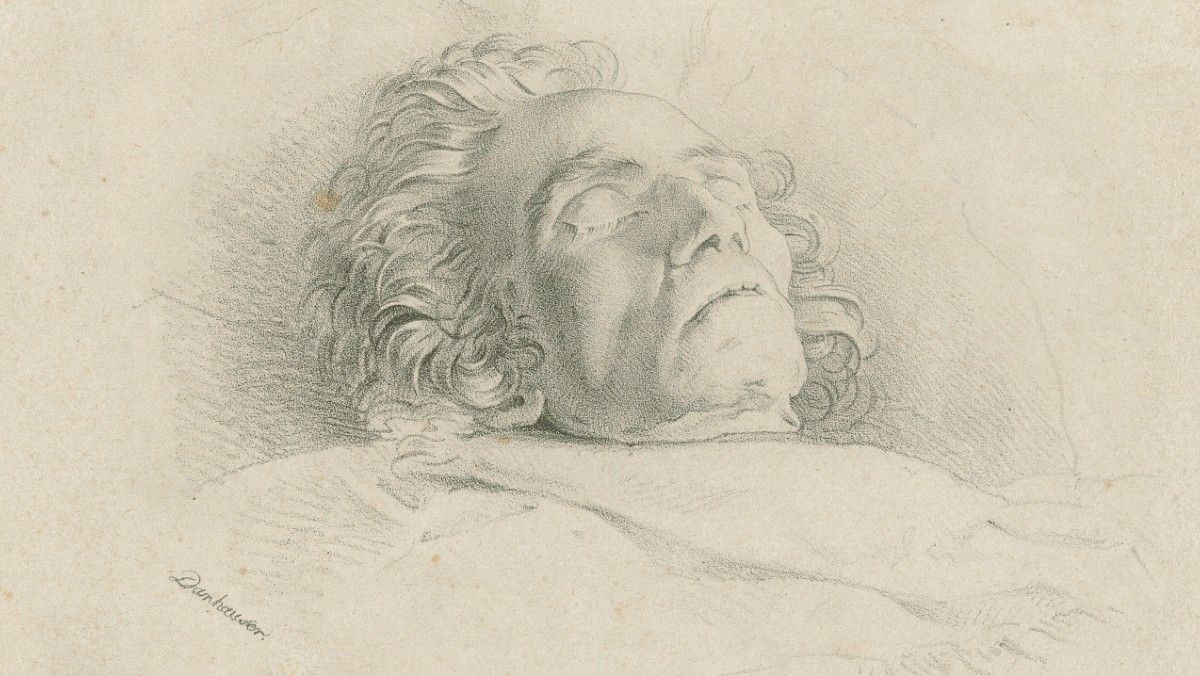-
An international team of researchers presents the first genomic study of the composer
-
The analysis investigates the causes of his deafness, the diseases that affected him throughout his life and the cause of his death.
The Beethoven’s life She was always marked by illness and, in a way, he always knew that the evils that had been blamed on him since his youth were going to be his death sentence. So much so that, when he was barely 32 years old, the composer asked his doctor, Dr. Schmidt, to describe his disease in detail so that «as far as possible, the world reconciles with me after my death«. For centuries there has been speculation about what diseases Beethoven suffered from and what caused his premature death. Now, thanks to the analysis of several locks of the composer’s hair, an international team of researchers has achieved get into the composer genome and plug the cause of the males that tormented him
The analysis, published this Wednesday in the scientific journal ‘Current Biology’, has managed to reconstruct the composer’s complete genome sequence. That is, all the information that was inscribed in their genes and that marked both his life and his death. «Our main aim was to shed light on Beethoven’s health problems, from the progressive hearing loss that led him to deafness until the Gastrointestinal disorders that made him suffer so much throughout his life,» explains Johannes Krause, a researcher at the Max Planck Institute for Evolutionary Anthropology and author of this study.
Related news
For centuries it has been speculated on the health and death of beethoven. The analysis of the letters that the German composer sent shows how the «terrible health problems» they suffered worsened over the years and caused him, for example, several jaundiced attacks in which his eyes and skin were dyed yellow. It has always been said that Beethoven died as a result of a prolonged illness. Some argue that the final trigger was a cirrhosis attack. And who thinks it had to do with a lead, opioid, or mercury poisoning. But what is true in all this?
This is the diagnosis which yields the first genetic analysis of Ludwig van Beethoven.
The analysis of Beethoven’s genome reveals that the German had genetic predisposition to have liver problems. Your genes indicate a number of risk factors that could have pushed him to suffer chronic and severe liver problems. To this, according to the experts, we must add the effect of their prolonged consumption of alcohol. «In his letters, Beethoven said that your consumption of alcoholic drinks was very regular. We cannot know exactly how much he consumed, but if his alcohol intake was heavy and long-lasting enough, the combination of this habit and his genetic risk factors Could you explain your chronic liver problems?«, explains Tristan Begg, from the University of Cambridge.

The genetic study also reveals that Beethoven suffered an infection caused by hepatitis B virus during his last months of life. It is known that this disease (which is transmitted either through blood contact or through sexual practices) increases the risk of developing liver failure, cirrhosis and other liver diseases. «It is likely that this infection contributed to his death,» explains the team that led this analysis.

Beethoven’s genes have not (yet) been able to provide a convincing explanation for the progressive hearing loss that affected the composer. According to the researchers who led this analysis, an attempt was made to trace the presence of various genetic diseases that could cause deafness but, for now, nothing has been found. «Although no genetic basis for Beethoven’s hearing loss has been found, this scenario cannot be completely ruled out. Future genomic analyzes may give more clues about the origins of this disease«, explains Axel Schmidt, a researcher at the Institute for Human Genetics at the University Hospital Bonn and author of this study.
Gastrointestinal disorders

Genetic analyzes ruled out the three main hypotheses that, until now, have been used to try to explain Beethoven’s gastrointestinal problems. The composer genome suggests that I was neither celiac nor intolerant to lactosto. did not have either irritable bowel syndrome (in fact, it seems that he had some degree of genetic protection against this disease). His stormy stomach problems continue without a clear explanation.
The Beethoven affair

One last point left by this genetic analysis, and which has nothing to do with the composer’s health, is the story of an affair in the composer’s family. The experts compared Ludwig van Beethoven’s genome with the five living relatives who, according to the family trees traced to date, live in present-day Belgium. Result that none of these five descendants is directly related with the composer. Experts believe this is due to an «extramarital affair» in Beethoven’s paternal line. That is, at some point in the seven generations prior to the birth of the artist, one of your ancestors had an ‘affaire’ that, two centuries later, has come to light.

